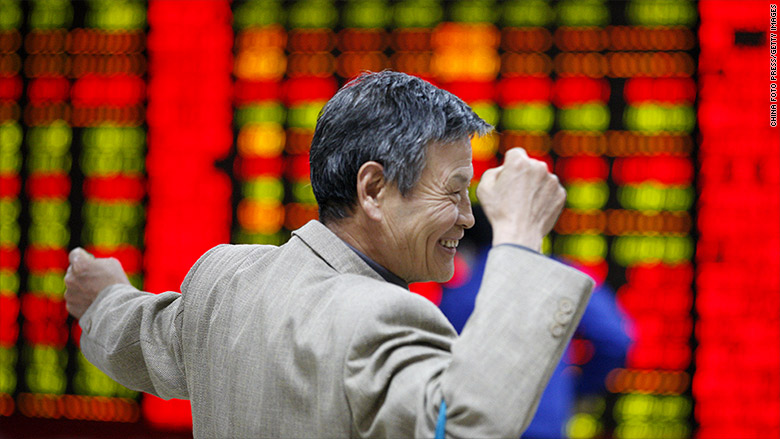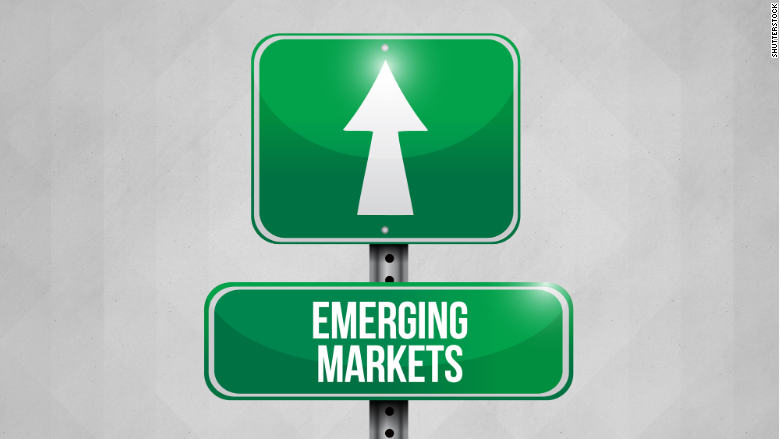
Emerging market stocks are having their moment in the sun.
The MSCI Emerging Market Index -- which includes stocks from countries like China, Brazil and Turkey -- is up over 10% in 2015.
That surpasses the Dow, S&P 500 and even Nasdaq this year. In fact, it's not far behind the soaring European stock markets.
Wait a hot second, you might be thinking. Aren't emerging markets suffering from too much debt in U.S. dollars, tanking commodity prices and slumping economies? The reality is all of those factors are still problems.
"Investors are still a little nervous," on emerging markets, says Win Thin, global head of emerging markets strategy for Brown Brothers Harriman. But "cautious optimism" is back, he says.
There are a few key factors driving the rebound: China's stock surge, the likely delay in a Federal Reserve interest rate hike, Europe's stimulus program and stabilizing commodity prices.
But be warned: the red flags haven't evaporated.
Related: Biggest loser from the strong dollar: Emerging Markets
China's stock rally = EM victory: China's markets are on a tear, helping to boost emerging market stocks right now. The MSCI China Index is up 27% this year. China's stocks make up about a fifth of all the stocks in the MSCI EM index. In other words, when they go up, so does the index.
There's widespread concern that Chinese stocks are in a bubble, becoming too valuable for an economy that's slowing down.
But the Chinese government could save the day. It recently announced a stimulus program to reboot economic growth, and it has made it easier for foreign investors to buy stocks in mainland China, helping bring a flood of cash into the market.
"What you've seen in the past month is nothing short of sensational," says Kevin Carter, founder of the EMQQ Index, an internet and e-commerce index in emerging markets. "There's great euphoria among Chinese investors."
What could cool that euphoria is a Fed rate hike.

Related: India is the world's fastest growing major economy. Can it last?
Central bank success: The U.S. economy has slowed down in 2015. Market experts now believe the Federal Reserve will likely raise rates in September, not June. Even when the central bank does start to raise rates, it's likely to be at a slow, faucet-drip pace.
Raising U.S. interest rates makes high-risk foreign debt in developing countries less attractive to investors. Why buy emerging market debt when American debt is becoming more profitable. It can also increase spending costs for companies that have loans in U.S. dollars.
But Fed Chair Janet Yellen clarified that the Fed would likely raise rates slowly. That plays well for emerging markets countries and companies.
"Even after the initial increase in the [Fed's interest rate], our policy is likely to remain highly accommodative," Yellen said. Translation: we're taking rate hikes slow and steady.
Since Yellen uttered those words on March 18, the MSCI EM index is up 10%. Even Brazil, mired by the Petrobras scandal, has actually seen stocks rise 5% since then too.
Europe is helping emerging markets too. Its central bank put interest rates near zero -- and some are negative -- which drives demand for more profitable emerging market bonds.
Related: How Colombia went from murder capital to tech powerhouse
Commodity crash could be leveling off: The final factor is commodities. Emerging economies rely heavily on exports like oil, sugar and soybeans to propel their growth. All those commodities have tanked in the past year due to an oversupply around the world and lower demand from China, Europe and elsewhere.
But the worst appears to be over -- for now. So far in April, oil is rallying, sugar is up a bit and soybeans are generally on a plateau. It's welcome news to see even a small rebound.
The big BUT: Many factors are playing well for emerging markets at the moment, but don't claim victory yet. The strong U.S. dollar is still driving up costs for countries and companies. A Fed rate hike could disrupt these markets later this year. China's stock market could prove to be a bubble and commodities are still wicked low.
Still, some emerging market stocks -- primarily in countries making reforms -- are a good buy right now, says Audrey Kaplan, senior portfolio manager at Federated Investors.
"I acknowledge that emerging markets are more risky," says Kaplan. But "I think that emerging markets will do better than most people are anticipating over the next five years."


